University Nursing Assignment: Mental Health Recovery Principles
VerifiedAdded on 2021/04/21
|8
|1621
|29
Essay
AI Summary
This nursing assignment delves into the principles of mental health recovery, emphasizing the importance of the individual's uniqueness, partnerships, effective communication, dignity, respect, and the rights of mental health consumers. The essay highlights the significance of partnerships between stakeholders in providing immediate responses to mental health issues and facilitating pharmacological or psychiatric assistance. It underscores the role of communication in fostering these partnerships and understanding cultural and ethnic differences. The assignment also addresses the attitude towards and rights of mental health consumers, advocating for positive attitudes and awareness to eliminate discrimination and promote social inclusion. Furthermore, it references the Mental Health Act 2014, which supports consumer rights and voluntary treatment, as well as the crucial role of advocacy in empowering consumers to express their views and participate in decisions affecting their lives. The essay concludes by emphasizing the need for respecting individual uniqueness, ensuring informed consent, and promoting dignity to enhance the overall wellbeing of mental health consumers. The recovery principles aim to eliminate relapse of mental disorders and instill a hope of leading a meaningful life among the consumers.

Running head: NURSING ASSIGNMENT
Assessment Item 2: Written Assessment
Name of the Student
Name of the University
Author Note
Assessment Item 2: Written Assessment
Name of the Student
Name of the University
Author Note
Paraphrase This Document
Need a fresh take? Get an instant paraphrase of this document with our AI Paraphraser
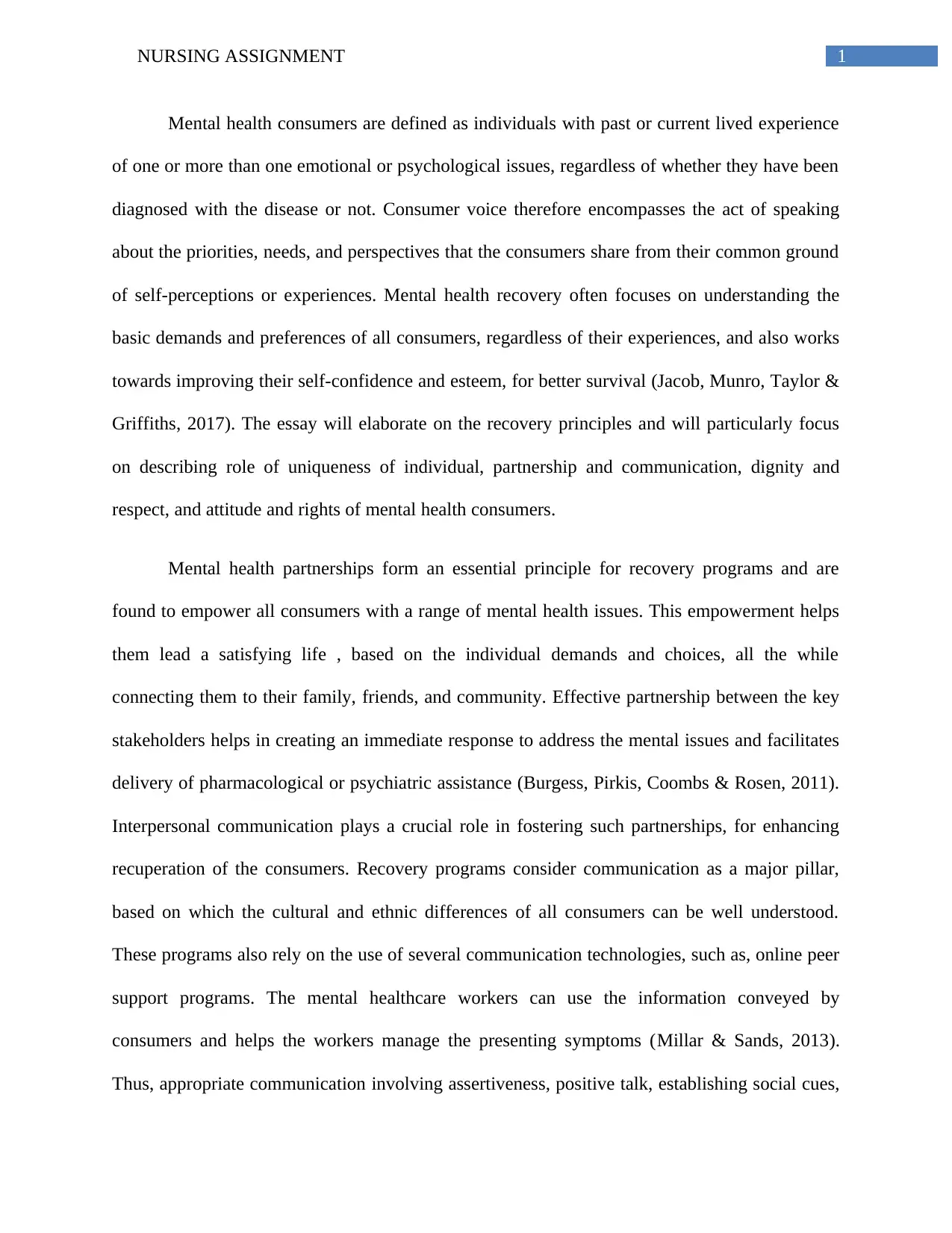
1NURSING ASSIGNMENT
Mental health consumers are defined as individuals with past or current lived experience
of one or more than one emotional or psychological issues, regardless of whether they have been
diagnosed with the disease or not. Consumer voice therefore encompasses the act of speaking
about the priorities, needs, and perspectives that the consumers share from their common ground
of self-perceptions or experiences. Mental health recovery often focuses on understanding the
basic demands and preferences of all consumers, regardless of their experiences, and also works
towards improving their self-confidence and esteem, for better survival (Jacob, Munro, Taylor &
Griffiths, 2017). The essay will elaborate on the recovery principles and will particularly focus
on describing role of uniqueness of individual, partnership and communication, dignity and
respect, and attitude and rights of mental health consumers.
Mental health partnerships form an essential principle for recovery programs and are
found to empower all consumers with a range of mental health issues. This empowerment helps
them lead a satisfying life , based on the individual demands and choices, all the while
connecting them to their family, friends, and community. Effective partnership between the key
stakeholders helps in creating an immediate response to address the mental issues and facilitates
delivery of pharmacological or psychiatric assistance (Burgess, Pirkis, Coombs & Rosen, 2011).
Interpersonal communication plays a crucial role in fostering such partnerships, for enhancing
recuperation of the consumers. Recovery programs consider communication as a major pillar,
based on which the cultural and ethnic differences of all consumers can be well understood.
These programs also rely on the use of several communication technologies, such as, online peer
support programs. The mental healthcare workers can use the information conveyed by
consumers and helps the workers manage the presenting symptoms (Millar & Sands, 2013).
Thus, appropriate communication involving assertiveness, positive talk, establishing social cues,
Mental health consumers are defined as individuals with past or current lived experience
of one or more than one emotional or psychological issues, regardless of whether they have been
diagnosed with the disease or not. Consumer voice therefore encompasses the act of speaking
about the priorities, needs, and perspectives that the consumers share from their common ground
of self-perceptions or experiences. Mental health recovery often focuses on understanding the
basic demands and preferences of all consumers, regardless of their experiences, and also works
towards improving their self-confidence and esteem, for better survival (Jacob, Munro, Taylor &
Griffiths, 2017). The essay will elaborate on the recovery principles and will particularly focus
on describing role of uniqueness of individual, partnership and communication, dignity and
respect, and attitude and rights of mental health consumers.
Mental health partnerships form an essential principle for recovery programs and are
found to empower all consumers with a range of mental health issues. This empowerment helps
them lead a satisfying life , based on the individual demands and choices, all the while
connecting them to their family, friends, and community. Effective partnership between the key
stakeholders helps in creating an immediate response to address the mental issues and facilitates
delivery of pharmacological or psychiatric assistance (Burgess, Pirkis, Coombs & Rosen, 2011).
Interpersonal communication plays a crucial role in fostering such partnerships, for enhancing
recuperation of the consumers. Recovery programs consider communication as a major pillar,
based on which the cultural and ethnic differences of all consumers can be well understood.
These programs also rely on the use of several communication technologies, such as, online peer
support programs. The mental healthcare workers can use the information conveyed by
consumers and helps the workers manage the presenting symptoms (Millar & Sands, 2013).
Thus, appropriate communication involving assertiveness, positive talk, establishing social cues,
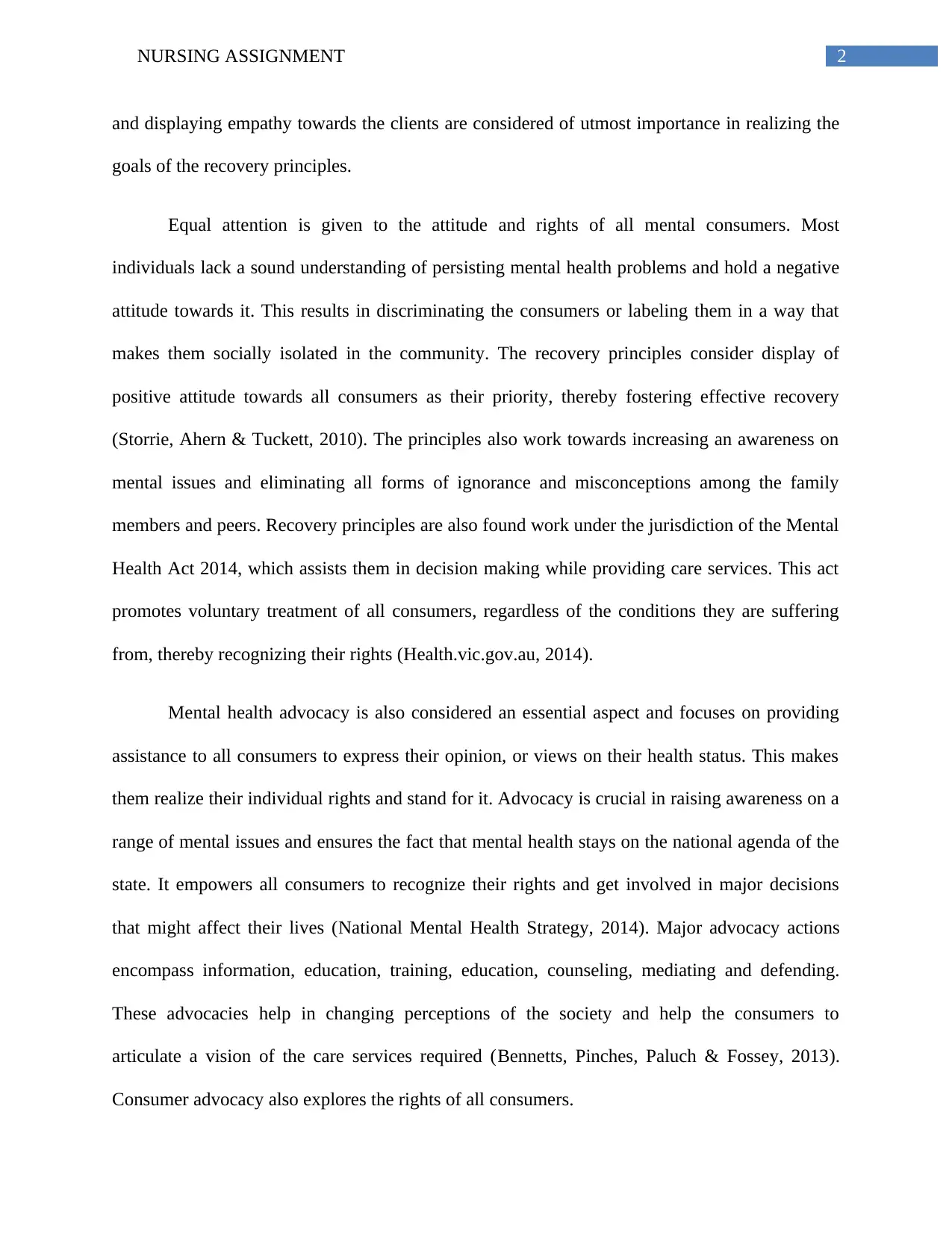
2NURSING ASSIGNMENT
and displaying empathy towards the clients are considered of utmost importance in realizing the
goals of the recovery principles.
Equal attention is given to the attitude and rights of all mental consumers. Most
individuals lack a sound understanding of persisting mental health problems and hold a negative
attitude towards it. This results in discriminating the consumers or labeling them in a way that
makes them socially isolated in the community. The recovery principles consider display of
positive attitude towards all consumers as their priority, thereby fostering effective recovery
(Storrie, Ahern & Tuckett, 2010). The principles also work towards increasing an awareness on
mental issues and eliminating all forms of ignorance and misconceptions among the family
members and peers. Recovery principles are also found work under the jurisdiction of the Mental
Health Act 2014, which assists them in decision making while providing care services. This act
promotes voluntary treatment of all consumers, regardless of the conditions they are suffering
from, thereby recognizing their rights (Health.vic.gov.au, 2014).
Mental health advocacy is also considered an essential aspect and focuses on providing
assistance to all consumers to express their opinion, or views on their health status. This makes
them realize their individual rights and stand for it. Advocacy is crucial in raising awareness on a
range of mental issues and ensures the fact that mental health stays on the national agenda of the
state. It empowers all consumers to recognize their rights and get involved in major decisions
that might affect their lives (National Mental Health Strategy, 2014). Major advocacy actions
encompass information, education, training, education, counseling, mediating and defending.
These advocacies help in changing perceptions of the society and help the consumers to
articulate a vision of the care services required (Bennetts, Pinches, Paluch & Fossey, 2013).
Consumer advocacy also explores the rights of all consumers.
and displaying empathy towards the clients are considered of utmost importance in realizing the
goals of the recovery principles.
Equal attention is given to the attitude and rights of all mental consumers. Most
individuals lack a sound understanding of persisting mental health problems and hold a negative
attitude towards it. This results in discriminating the consumers or labeling them in a way that
makes them socially isolated in the community. The recovery principles consider display of
positive attitude towards all consumers as their priority, thereby fostering effective recovery
(Storrie, Ahern & Tuckett, 2010). The principles also work towards increasing an awareness on
mental issues and eliminating all forms of ignorance and misconceptions among the family
members and peers. Recovery principles are also found work under the jurisdiction of the Mental
Health Act 2014, which assists them in decision making while providing care services. This act
promotes voluntary treatment of all consumers, regardless of the conditions they are suffering
from, thereby recognizing their rights (Health.vic.gov.au, 2014).
Mental health advocacy is also considered an essential aspect and focuses on providing
assistance to all consumers to express their opinion, or views on their health status. This makes
them realize their individual rights and stand for it. Advocacy is crucial in raising awareness on a
range of mental issues and ensures the fact that mental health stays on the national agenda of the
state. It empowers all consumers to recognize their rights and get involved in major decisions
that might affect their lives (National Mental Health Strategy, 2014). Major advocacy actions
encompass information, education, training, education, counseling, mediating and defending.
These advocacies help in changing perceptions of the society and help the consumers to
articulate a vision of the care services required (Bennetts, Pinches, Paluch & Fossey, 2013).
Consumer advocacy also explores the rights of all consumers.
⊘ This is a preview!⊘
Do you want full access?
Subscribe today to unlock all pages.

Trusted by 1+ million students worldwide
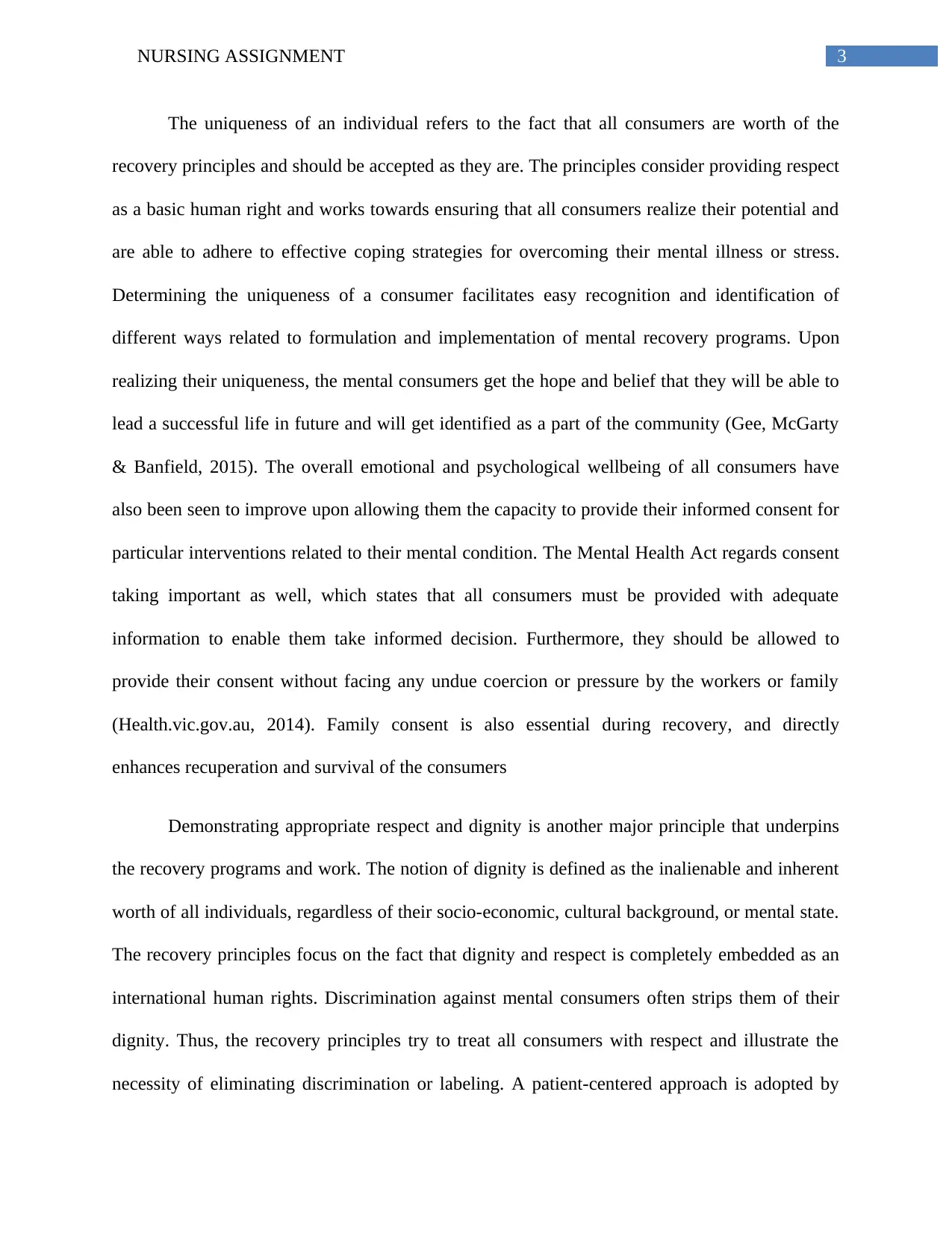
3NURSING ASSIGNMENT
The uniqueness of an individual refers to the fact that all consumers are worth of the
recovery principles and should be accepted as they are. The principles consider providing respect
as a basic human right and works towards ensuring that all consumers realize their potential and
are able to adhere to effective coping strategies for overcoming their mental illness or stress.
Determining the uniqueness of a consumer facilitates easy recognition and identification of
different ways related to formulation and implementation of mental recovery programs. Upon
realizing their uniqueness, the mental consumers get the hope and belief that they will be able to
lead a successful life in future and will get identified as a part of the community (Gee, McGarty
& Banfield, 2015). The overall emotional and psychological wellbeing of all consumers have
also been seen to improve upon allowing them the capacity to provide their informed consent for
particular interventions related to their mental condition. The Mental Health Act regards consent
taking important as well, which states that all consumers must be provided with adequate
information to enable them take informed decision. Furthermore, they should be allowed to
provide their consent without facing any undue coercion or pressure by the workers or family
(Health.vic.gov.au, 2014). Family consent is also essential during recovery, and directly
enhances recuperation and survival of the consumers
Demonstrating appropriate respect and dignity is another major principle that underpins
the recovery programs and work. The notion of dignity is defined as the inalienable and inherent
worth of all individuals, regardless of their socio-economic, cultural background, or mental state.
The recovery principles focus on the fact that dignity and respect is completely embedded as an
international human rights. Discrimination against mental consumers often strips them of their
dignity. Thus, the recovery principles try to treat all consumers with respect and illustrate the
necessity of eliminating discrimination or labeling. A patient-centered approach is adopted by
The uniqueness of an individual refers to the fact that all consumers are worth of the
recovery principles and should be accepted as they are. The principles consider providing respect
as a basic human right and works towards ensuring that all consumers realize their potential and
are able to adhere to effective coping strategies for overcoming their mental illness or stress.
Determining the uniqueness of a consumer facilitates easy recognition and identification of
different ways related to formulation and implementation of mental recovery programs. Upon
realizing their uniqueness, the mental consumers get the hope and belief that they will be able to
lead a successful life in future and will get identified as a part of the community (Gee, McGarty
& Banfield, 2015). The overall emotional and psychological wellbeing of all consumers have
also been seen to improve upon allowing them the capacity to provide their informed consent for
particular interventions related to their mental condition. The Mental Health Act regards consent
taking important as well, which states that all consumers must be provided with adequate
information to enable them take informed decision. Furthermore, they should be allowed to
provide their consent without facing any undue coercion or pressure by the workers or family
(Health.vic.gov.au, 2014). Family consent is also essential during recovery, and directly
enhances recuperation and survival of the consumers
Demonstrating appropriate respect and dignity is another major principle that underpins
the recovery programs and work. The notion of dignity is defined as the inalienable and inherent
worth of all individuals, regardless of their socio-economic, cultural background, or mental state.
The recovery principles focus on the fact that dignity and respect is completely embedded as an
international human rights. Discrimination against mental consumers often strips them of their
dignity. Thus, the recovery principles try to treat all consumers with respect and illustrate the
necessity of eliminating discrimination or labeling. A patient-centered approach is adopted by
Paraphrase This Document
Need a fresh take? Get an instant paraphrase of this document with our AI Paraphraser
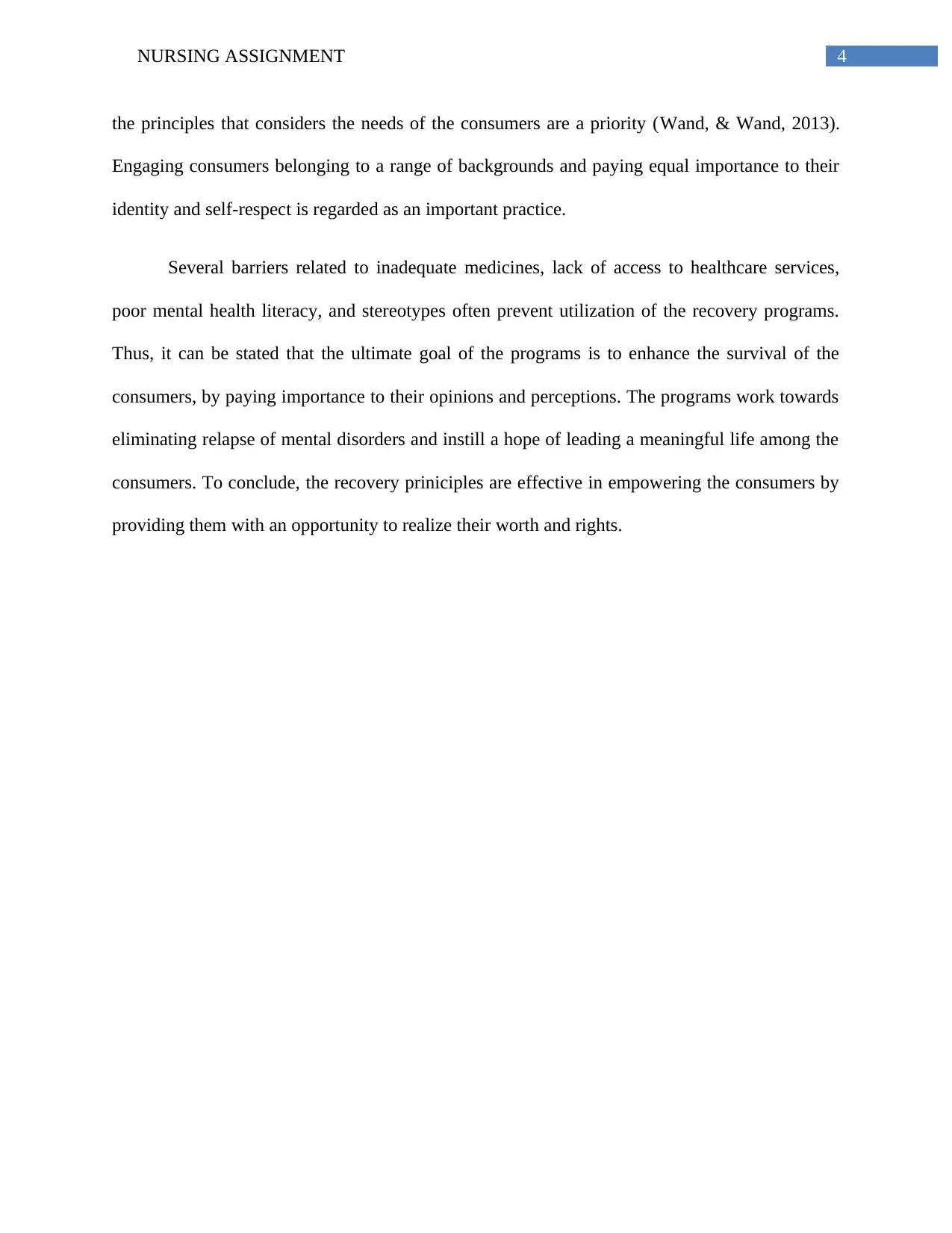
4NURSING ASSIGNMENT
the principles that considers the needs of the consumers are a priority (Wand, & Wand, 2013).
Engaging consumers belonging to a range of backgrounds and paying equal importance to their
identity and self-respect is regarded as an important practice.
Several barriers related to inadequate medicines, lack of access to healthcare services,
poor mental health literacy, and stereotypes often prevent utilization of the recovery programs.
Thus, it can be stated that the ultimate goal of the programs is to enhance the survival of the
consumers, by paying importance to their opinions and perceptions. The programs work towards
eliminating relapse of mental disorders and instill a hope of leading a meaningful life among the
consumers. To conclude, the recovery priniciples are effective in empowering the consumers by
providing them with an opportunity to realize their worth and rights.
the principles that considers the needs of the consumers are a priority (Wand, & Wand, 2013).
Engaging consumers belonging to a range of backgrounds and paying equal importance to their
identity and self-respect is regarded as an important practice.
Several barriers related to inadequate medicines, lack of access to healthcare services,
poor mental health literacy, and stereotypes often prevent utilization of the recovery programs.
Thus, it can be stated that the ultimate goal of the programs is to enhance the survival of the
consumers, by paying importance to their opinions and perceptions. The programs work towards
eliminating relapse of mental disorders and instill a hope of leading a meaningful life among the
consumers. To conclude, the recovery priniciples are effective in empowering the consumers by
providing them with an opportunity to realize their worth and rights.
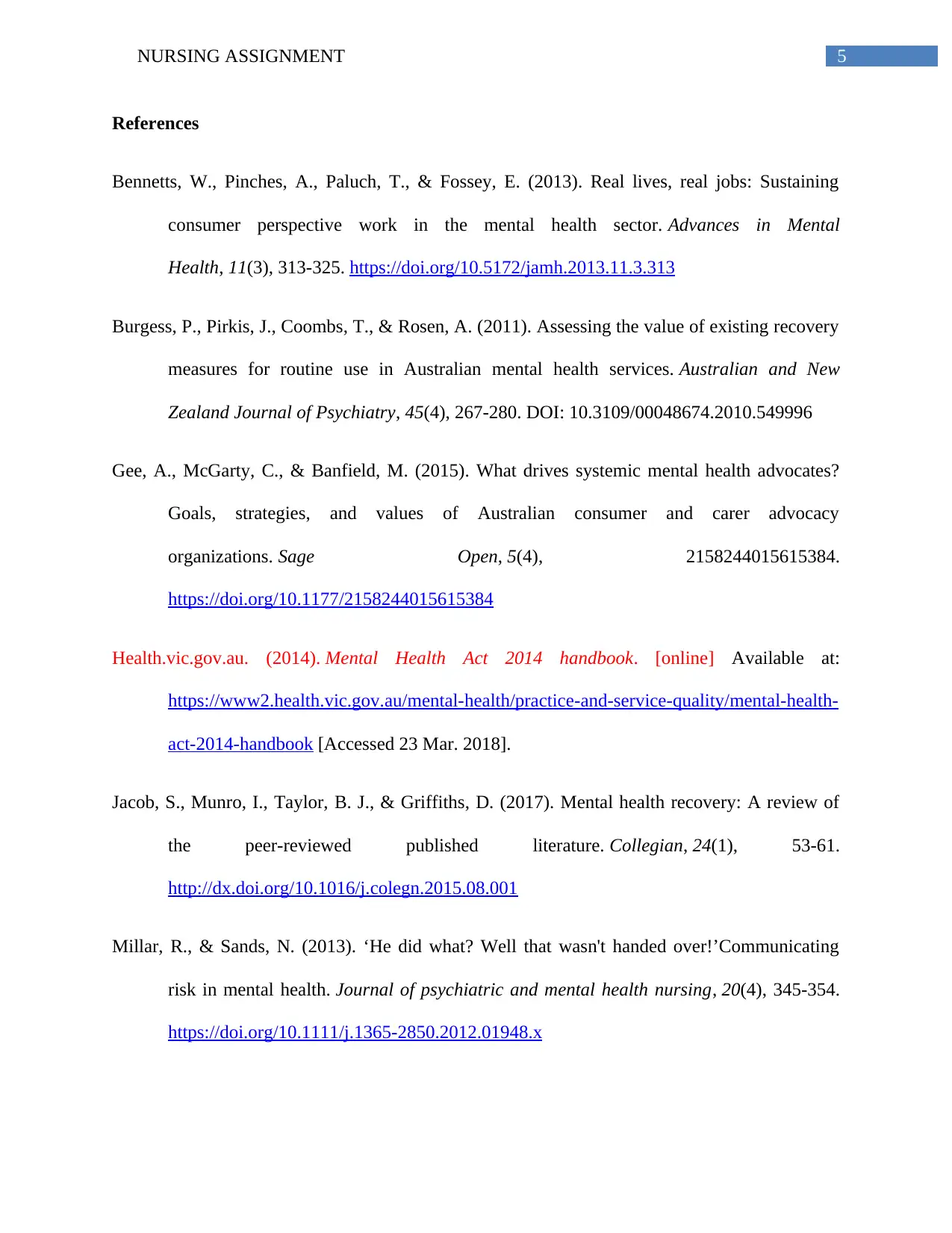
5NURSING ASSIGNMENT
References
Bennetts, W., Pinches, A., Paluch, T., & Fossey, E. (2013). Real lives, real jobs: Sustaining
consumer perspective work in the mental health sector. Advances in Mental
Health, 11(3), 313-325. https://doi.org/10.5172/jamh.2013.11.3.313
Burgess, P., Pirkis, J., Coombs, T., & Rosen, A. (2011). Assessing the value of existing recovery
measures for routine use in Australian mental health services. Australian and New
Zealand Journal of Psychiatry, 45(4), 267-280. DOI: 10.3109/00048674.2010.549996
Gee, A., McGarty, C., & Banfield, M. (2015). What drives systemic mental health advocates?
Goals, strategies, and values of Australian consumer and carer advocacy
organizations. Sage Open, 5(4), 2158244015615384.
https://doi.org/10.1177/2158244015615384
Health.vic.gov.au. (2014). Mental Health Act 2014 handbook. [online] Available at:
https://www2.health.vic.gov.au/mental-health/practice-and-service-quality/mental-health-
act-2014-handbook [Accessed 23 Mar. 2018].
Jacob, S., Munro, I., Taylor, B. J., & Griffiths, D. (2017). Mental health recovery: A review of
the peer-reviewed published literature. Collegian, 24(1), 53-61.
http://dx.doi.org/10.1016/j.colegn.2015.08.001
Millar, R., & Sands, N. (2013). ‘He did what? Well that wasn't handed over!’Communicating
risk in mental health. Journal of psychiatric and mental health nursing, 20(4), 345-354.
https://doi.org/10.1111/j.1365-2850.2012.01948.x
References
Bennetts, W., Pinches, A., Paluch, T., & Fossey, E. (2013). Real lives, real jobs: Sustaining
consumer perspective work in the mental health sector. Advances in Mental
Health, 11(3), 313-325. https://doi.org/10.5172/jamh.2013.11.3.313
Burgess, P., Pirkis, J., Coombs, T., & Rosen, A. (2011). Assessing the value of existing recovery
measures for routine use in Australian mental health services. Australian and New
Zealand Journal of Psychiatry, 45(4), 267-280. DOI: 10.3109/00048674.2010.549996
Gee, A., McGarty, C., & Banfield, M. (2015). What drives systemic mental health advocates?
Goals, strategies, and values of Australian consumer and carer advocacy
organizations. Sage Open, 5(4), 2158244015615384.
https://doi.org/10.1177/2158244015615384
Health.vic.gov.au. (2014). Mental Health Act 2014 handbook. [online] Available at:
https://www2.health.vic.gov.au/mental-health/practice-and-service-quality/mental-health-
act-2014-handbook [Accessed 23 Mar. 2018].
Jacob, S., Munro, I., Taylor, B. J., & Griffiths, D. (2017). Mental health recovery: A review of
the peer-reviewed published literature. Collegian, 24(1), 53-61.
http://dx.doi.org/10.1016/j.colegn.2015.08.001
Millar, R., & Sands, N. (2013). ‘He did what? Well that wasn't handed over!’Communicating
risk in mental health. Journal of psychiatric and mental health nursing, 20(4), 345-354.
https://doi.org/10.1111/j.1365-2850.2012.01948.x
⊘ This is a preview!⊘
Do you want full access?
Subscribe today to unlock all pages.

Trusted by 1+ million students worldwide
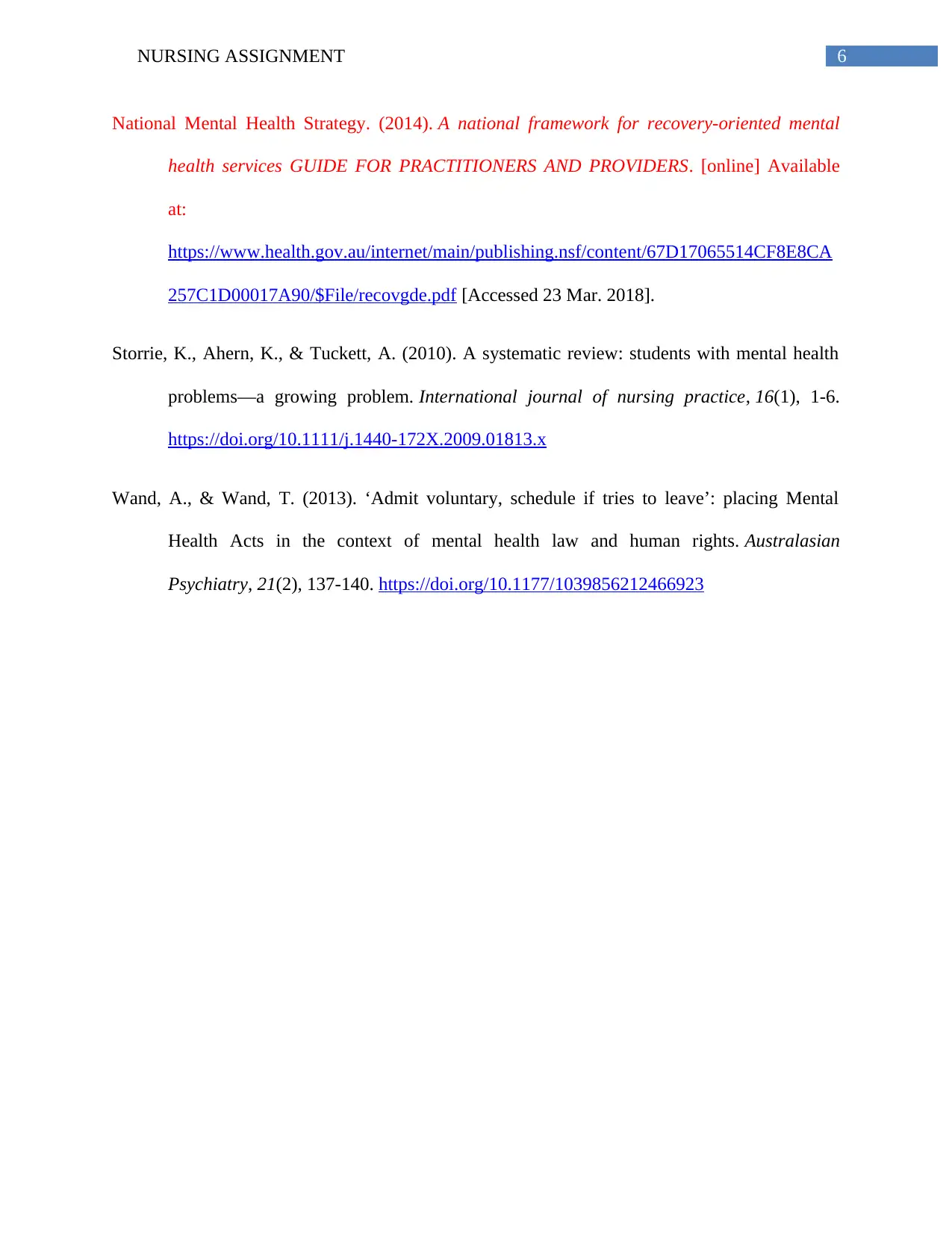
6NURSING ASSIGNMENT
National Mental Health Strategy. (2014). A national framework for recovery-oriented mental
health services GUIDE FOR PRACTITIONERS AND PROVIDERS. [online] Available
at:
https://www.health.gov.au/internet/main/publishing.nsf/content/67D17065514CF8E8CA
257C1D00017A90/$File/recovgde.pdf [Accessed 23 Mar. 2018].
Storrie, K., Ahern, K., & Tuckett, A. (2010). A systematic review: students with mental health
problems—a growing problem. International journal of nursing practice, 16(1), 1-6.
https://doi.org/10.1111/j.1440-172X.2009.01813.x
Wand, A., & Wand, T. (2013). ‘Admit voluntary, schedule if tries to leave’: placing Mental
Health Acts in the context of mental health law and human rights. Australasian
Psychiatry, 21(2), 137-140. https://doi.org/10.1177/1039856212466923
National Mental Health Strategy. (2014). A national framework for recovery-oriented mental
health services GUIDE FOR PRACTITIONERS AND PROVIDERS. [online] Available
at:
https://www.health.gov.au/internet/main/publishing.nsf/content/67D17065514CF8E8CA
257C1D00017A90/$File/recovgde.pdf [Accessed 23 Mar. 2018].
Storrie, K., Ahern, K., & Tuckett, A. (2010). A systematic review: students with mental health
problems—a growing problem. International journal of nursing practice, 16(1), 1-6.
https://doi.org/10.1111/j.1440-172X.2009.01813.x
Wand, A., & Wand, T. (2013). ‘Admit voluntary, schedule if tries to leave’: placing Mental
Health Acts in the context of mental health law and human rights. Australasian
Psychiatry, 21(2), 137-140. https://doi.org/10.1177/1039856212466923
Paraphrase This Document
Need a fresh take? Get an instant paraphrase of this document with our AI Paraphraser

7NURSING ASSIGNMENT
1 out of 8
Related Documents
Your All-in-One AI-Powered Toolkit for Academic Success.
+13062052269
info@desklib.com
Available 24*7 on WhatsApp / Email
![[object Object]](/_next/static/media/star-bottom.7253800d.svg)
Unlock your academic potential
Copyright © 2020–2026 A2Z Services. All Rights Reserved. Developed and managed by ZUCOL.





